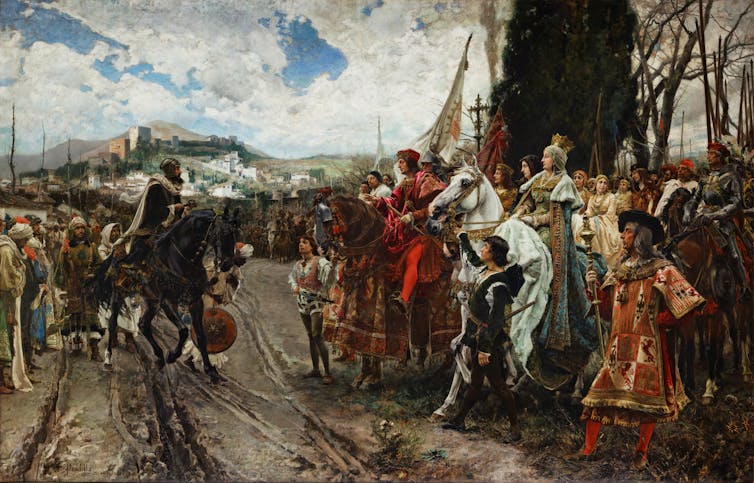
The rapid decline in Campbell Newman’s popularity is a symptom of Australia’s growing discontent with neoliberal economic policy
Seven years after the economic crises of 2008, there are signs that one response to them is reaching its limits. Austerity economics, grounded in an “Old Testament theory of the business cycle”, is not only meeting electoral rejection, but is corroding the political legitimacy of its proponents and undermining political arrangements that have long been taken for granted. This is most obvious in the success of leftwing populists in Greece and Spain, and the growth of previously marginal leftwing parties in the UK and elsewhere. But it’s also evident in places where no viable radical alternative yet exists. Which brings us to Queensland.
Despite the weirdness of Campbell Newman running for premier from outside the parliament in 2012, his government began its work in a familiar, austerian manner. He won in large part because he was not Anna Bligh. Conscious of the damage she had done herself by moving to privatise rail assets, his campaign carefully played down his real intentions. Once he was in the harness, he appointed former federal Liberal treasurer Peter Costello to head a commission of audit on the state’s finances. Its findings legitimised a program of cuts, and licensed war on the public sector and its unions (or so Newman hoped).
Armed with dire warnings of fiscal disaster, the government applied punitive “remedies” to an economy already unwinding at the end of the resources boom. He sacked thousands of public servants in every corner of the state. He attacked public health, taking on doctors and nurses. He moved to privatise public infrastructure via the boondoggle of “long term leases”. And in a attempt at compensatory populism, he used authoritarian state power to crack down on a handy folk devil, bikie gangs, which were touted as a greater threat to law and order than his own actions, like appointing a mate as chief justice, or weakening the state’s corruption watchdog.
Like all such programs of destruction, Newman’s was badged as “reform”. As the philosopher Jacques Rancière points out, this is a word which in recent decades has simply become a way for the powerful to “mark the distance between what is good for the people and what they desire”. “Reform” in the modern sense of liquidating public property, weighting industrial relations in favour of employers, and crippling public services has never been popular.
Advertisement
Commissions, whether temporary (like Costello’s) or permanent (like the Productivity Commission) are efforts to depoliticise economic decision-making, allowing politicians to argue that they are guided by the science of experts when they implement neoliberal orthodoxy. It’s a well worn strategy. Newman’s commission replicated the one employed in Western Australia in 2008, in Victoria and New South Wales in 2011, and in the Northern Territory in 2012. And in turn, Tony Abbott replicated it in 2013, appointing the head of the Business Council of Australia, Tony Shepherd, to oversee a review of the national accounts.
Like Newman, Abbott used the findings as a pretext for reversing his election pledges. Like Abbott, Newman is finding out that the electorate no longer quite buys it. His party may scrape home, but it will be far closer than it ought to have been after one term which began with a crushing majority. If the polls are right, Newman won’t win his own seat of Ashgrove. After leading a parliamentary party he wasn’t a member of into government, he’ll now possibly lead them to a narrow victory he’ll have no further part in.
Should we end up with a Newman-less LNP government, his successor will struggle to convince the electorate of their basic legitimacy, let alone of the wisdom of the agenda that destroyed Newman’s standing. If the LNP is wiped out in Brisbane, it will strengthen the premiership claims of unpopular old Nationals like two-time loser Lawrence Springborg. After only three years, the LNP’s prospects are bleak.
Part of the problem is that it is not delivering the promised results: Queensland’s growth and employment figures are worse than when Newman assumed office, even as he has spent the term throwing more workers onto the economic scrap-heap. As Lenore Taylor pointed out, Queensland’s unemployment rate of 6.5% is now the same as Tasmania’s. But the picture is worse in the provincial cities of Australia’s most decentralised state: unemployment is running at 7.8% in Townsville, and 8.2% in Cairns. The real wage growth of low-paid workers has fallen below the rate of inflation. Austerity has translated into a direct assault on the economy and living standards, with no improvement in sight.
But beyond this, the LNP has attacked bedrock institutions which are not only integral parts of Queensland communities, but highly valued in and of themselves as “public things”. Hospitals and schools, railways and ports are not just infrastructure, but repositories of collective memory and achievement. Clean groundwater and the reef are not cesspits in which to dump our externalities, but things worthy of preservation. After decades in which market liberalism has triumphed, we have not only learned that we are permanently worse off when assets are privatised and economies liberalised, but that we lose a little more of our purchase on the world.
Labor may be the beneficiaries of an austerity backlash in Queensland, but it’s not because they have renounced economic orthodoxy, or sought to oppose its consequences. Just as Newman was elected because he was not Bligh, Annastacia Palaszczuk is relying on disaffection with the incumbent. All over Australia, the electoral see-saw is accelerating, with short or nonexistent honeymoons, and more governments in trouble within a single term.
Politicians and large sections of the media are still desperately trying to pretend that this does not signal a deeper problem. Australia may not be deep enough into its own version of economic crisis to produce a radical alternative party of government. But there are signs to suggest that here, as in other parts of the world, the idea that the era in which we could imagine no alternative to doctrinaire economic liberalism is coming to an end.
• On 1 February 2015 this article was amended to correct a misspelling of the Labor leader’s name.
















You must be logged in to post a comment.